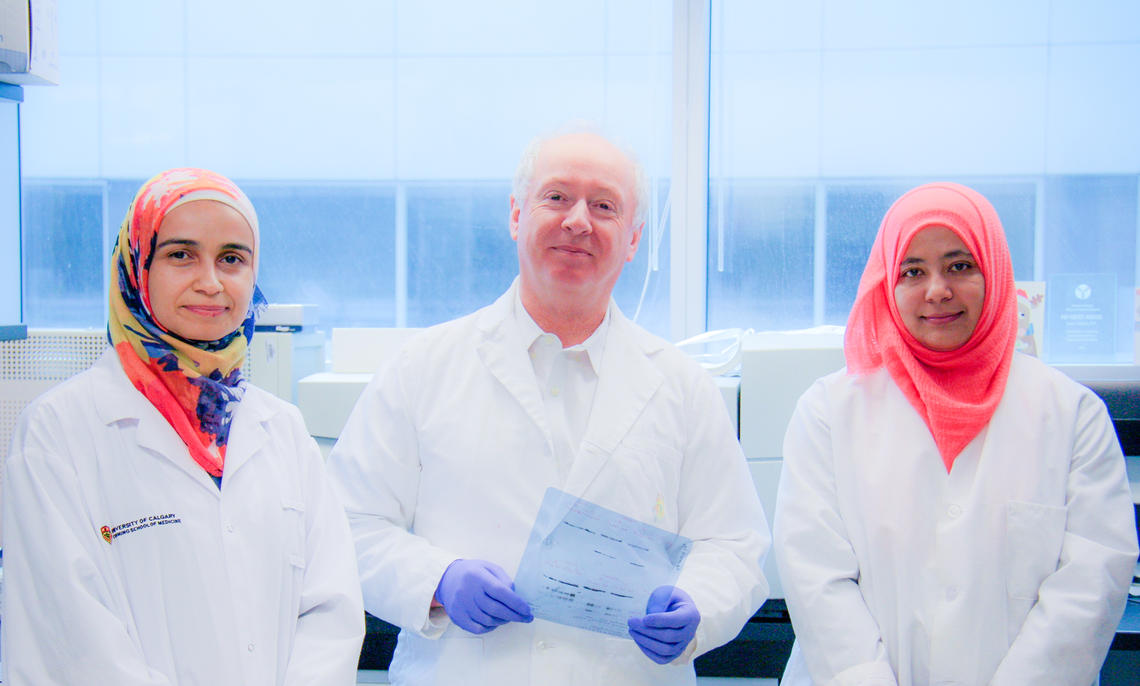April 18, 2019
UCalgary study finds vaccine protects against chronic wasting disease

Cases of an infectious disease that kills deer, elk, and moose are on the rise in Alberta.
Similar to mad cow disease (BSE) in cattle, chronic wasting disease (CWD) is a prion disease of members of the deer family. Infected animals lose weight drastically (wasting), and suffer other symptoms like stumbling, lack of co-ordination, and drooling. CWD is fatal in all cases. There is no cure, treatment, or way to prevent it.
But the study of a vaccine against CWD has made researchers in the Faculty of Veterinary Medicine (UCVM) hopeful. The study was published recently in the Journal of Biological Chemistry. It found the vaccine, tested in a mouse model, prolonged the time before infected animals developed symptoms by up to 60 per cent.
“The vaccine doesn’t prevent the disease, but it delays its onset,” says Dr. Dalia Abdelaziz, PhD, a researcher in Hermann Schaetzl’s lab. “And that’s what we want. In mice, if we are extending it for around 70 days that’s significant, because their life span is much shorter than deer or elk. That’s why we are excited about the results. We couldn’t induce full protection, but the survival time was greatly increased.”
Triggering an animals’ immune system to fight its own mutant proteins
CWD isn’t caused by a virus or bacteria. The infective agent is a prion — an abnormal form of a harmless protein found in the brain. Once prions are present in the brain, they multiply by causing normal proteins to refold into an abnormal shape.
“The immune system of the animal doesn’t detect prions as an enemy, so there’s no immune response against the disease,” says Simrika Thapa, an Eyes High and Killam doctoral student and co-author of the study. “We are trying to create an immunogen that induces an immune response in the animal. It’s like a flu shot producing a response so your body recognizes and defends itself against the disease.”

Dalia Abdelaziz, Hermann Schaetzl, and Simrika Thapa published a study of a vaccine.
CWD ‘spreading like crazy’ in North America
“There’s no treatment, and the other huge problem with this disease is it’s very contagious, so its spreading like crazy in North America,” says Abdelaziz. “Animals spread the infection, shedding it in their urine, saliva and feces, and the result is the infection is almost everywhere in the environment.”
“It’s not just in the animals’ brains, it’s in their muscles as well,” adds Thapa. “It’s not only in the central nervous system, it’s throughout the body. When an animal dies and decomposes in the environment, they are contaminating all the plants and the soil. So, when deer eat plants or get in contact with soil, the infectious protein gets inside the body. And the infectious protein can stay in the soil for many years.”
Does CWD pose a risk to people?
There are questions about whether CWD can jump the species barrier and infect people. That’s what happened in another prion disease called variant Creutzfeldt-Jacob disease, the human form of mad cow disease.
“The potential of cross-species transmission into humans is an alarming issue and is still an open question,” says Abdelaziz. “There haven’t been any reported cases of CWD in people, but studies of squirrel monkeys have shown its transmissibility into non-human primates.” The Schaetzl lab is part of a multinational consortium studying whether CWD can infect also macaques, using transgenic mouse models as an additional read-out.
The question now is whether the vaccine is as effective in deer. As a first step, Dr. Rob McCorkell, DVM, with the help of three vet med students, did immunization studies in reindeer at UCVM’s Spy Hill campus.
“Our next step is to work on an oral vaccine that can be used in wildlife. You can’t vaccinate free-ranging deer by injection, so we are considering plant-based vaccines that can be eaten directly by deer and elk,” says Abdelaziz. “We are working on arranging collaborations with other facilities where it is possible to immunize and then infect with CWD, to test in the real host.”
“We have lots of future directions in this project, and we are so excited.”

Chronic wasting disease (CWD) is an infectious, neurological disease that kills members of the deer family including white-tailed deer, mule deer, elk, and moose.




